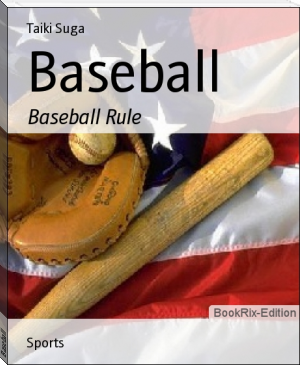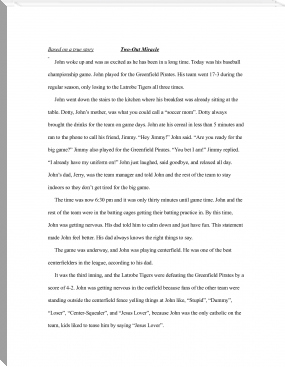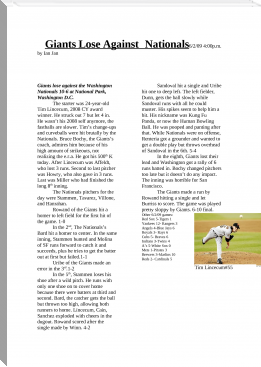The Prospect - Eliot Parker (top 10 novels .txt) 📗

- Author: Eliot Parker
Book online «The Prospect - Eliot Parker (top 10 novels .txt) 📗». Author Eliot Parker
The Prospect
By
Eliot Parker
To my dad, Brent, whose love, understanding, and support are qualities I will always cherish as they inspire me each day. Dad, you also taught me to love the game of baseball, including all of its intricacies.
Acknowledgements
I was influenced by so many people and so many organizations in writing this book. Without them, this project would never have been completed.
Jim Tocco, play-by-play announcer for the Montgomery Biscuits, Andy Barch, play-by-play announcer for the West Virginia Power, and Larry McKay, former play-by-play commentator of the Bluefield Orioles provided plenty of stories about life within minor league baseball and how players and teams co-exist with one another over the course of a long season. Some of their stories made it into this book, and I appreciate their insights.
The West Virginia Division of Natural Resources and the West Virginia Division of Culture and History maintain a wealth of information about the state’s natural resources as well as the culture of the state and her citizens. The information provided by these agencies enabled me to make Sheaville, West Virginia a real place for my characters.
WRVC AM 930 Sports Director Woody Woodrum has been an inspiration to me for a number of years. Woody has taught me to value the players that play sports, because many times their stories and experiences shape what we see on the field. Working alongside him “talking sports” on a weekly basis is an honor.
The faculty and staff of Marshall Community and Technical College always remind me to try new experiences, even if I lack the confidence to do so. Their beliefs in my abilities inside and outside the classroom inspire me to demonstrate excellence.
Special thanks to the South Atlantic League and Minorleaguebaseball.com for providing individual team histories along with the history of minor league baseball.
Finally, thanks to my Mom, Tonya, and my brother Evan, who aggravated me everyday until I finished writing this book. I am grateful for their love and support.
“Loggers lose 4-2!”
The arrogant tone of Charleston Alley Cats radio broadcaster Jim Thomas was echoed throughout the rusted speakers at Clark Field. Unfortunately for him, nobody was around to listen. The ballpark seats were now unusually silent. The only sounds heard around Clark Field were the sounds of 1,000 pairs of feet clapping against the concrete as fans frantically flocked to the exits complete with the occasional brash grumbling and complaining from fans who hate to see their team lose.
Under the grandstand, fans talked, laughed, moaned, and argued over why the team was the town disappointment, at least for the day. The voices were stern but unrecognizable, concerned yet calm, loud and yet soft.
On the field, the Loggers players aimlessly gathered their equipment and proceeded to scurry down the steps onto the platform landing adjacent to the dugout and down the narrow corridor to the locker room, where there would certainly be time for individual reflection for the team’s dismal performance.
The last man off the field for each Loggers game was manager Walter Mann. A robust and burly individual from Athens, Georgia, Mann spent 10 years as a first baseman for the Chicago Cubs in the 1970’s. During his career, Mann hit .287 and drove in over 400 runs. His tenacity and hustle made him a fan favorite in Chicago, yet he owns the Major League Baseball record for most errors by a first baseman. Nevertheless, Mann retired from baseball in 1980 after being diagnosed with a degenerative right hip that today makes him walk with a slight gait. He has managed the Sheaville Loggers since 1990.
Mann looked over across Clark field and the grandstand and sighed greatly. He looked up at the sun-drenched sky as it proceeded to bypass the stadium and slip behind the large green mountain behind the center field wall. All day, the sun lit up the sky in magnificent splendor. The rays beamed across Sheaville for the entire day, as sun was an orange appetizer for a main course of crystal clear blue skies and with a touch of a light breeze. His glance shifted to the short, narrow isles littered with empty food wrappers, plastic cups, and other refuse. The empty seats featured chipped blue paint. As far as the Walter knew, those seats had not been painted since he came to Sheaville in 1990.
As Mann turned to walk towards the dugout platform, he heard footsteps scraping across the infield dirt. Mann loved to hear the sounds of cleats on dirt. It often reminded him of the days he used to patrol the infield and platoon first base. However, by now the field should be totally empty. Walter always made sure it was.
He abruptly turned and walked to other side of the dugout and climbed the three concrete steps and rose to reach field level, near the third base on-deck circle. A crisp, cool breeze slammed against his right cheek, causing his baldhead to formulate goose bumps.
What he saw in this distance was a tall, muscular shadow coming towards him slowly, with one hand carrying a baseball glove and the other a swollen, fiery red bag. The bag was the only splash of color on the dark shadow as the evening approached. Mann assumed the bag contained baseball bats, though he was not certain. The shadow was coming into focus slowly, almost creeping along the infield as it approached third base. As it approached the dugout, the shadow became bigger but its features remained conspicuous.
In the distance, Jim Morris continued to talk. He was reading over the box scores of today’s game and was preparing to begin the game summary. Mann quickly glanced towards a silver speaker covered with rust, then quickly returned to the field.
After what seemed like hours, the large dark shadow came into focus. Mann’s eyes widened and his nostrils flared slightly. “Damnit, Triplet, what the hell are you doing?”
Shane Triplet abruptly stopped in front of his manager and cautiously slid the red bag off his shoulder and it skidded against the ground. Shane’s light blue eyes glistened in the ongoing sunset and his wet and golden blond hair hung over his left eye. Walter immediately slammed his hands against his hips. Shane took his left hand and slid strands of his hair over his eye as he ran his hand towards the back of this head.
Shane was silent. He knew what was coming. From his other teammates, he learned that Walter Mann did not talk much, but when he did, you listened and followed his instructions explicitly.
“Yer new at this game son, so let me speak frankly,” Mann barked. “When the game’s over, you gather yer things and follow the rest of your team into the dugout.” He pointed with his index finger towards the steps leading to the dugout.
As he spoke, his drawl became think and slurred. Shane squatted alongside his bag, which did contain baseball bats, and gathered it by the large red strap. He flung the strap over his right shoulder and exhaled a deep breath. He eyes immediately met the frozen stare of his manager.
Walter shifted the balance of his body to his right foot and the muscles in his face tightened as he continued his lecture.
“Yer no better, nor different than the rest of them, you here me?” Mann barked. “You wanna be a part of this team, this experience, than get yer act together and start acting like it. This ain’t high school kid!”
Walter knew the entire backgrounds of each of his players explicitly, including Shane Triplet. The veteran manager knew that high school coaches with talented players would often times overuse that player to garner attention and success for the team, even if it meant having that one player do everything. The problem, as Walter sees it, is that you create a superiority complex in young kids that leads to patches of self-righteous behavior. When those players become minor league ballplayers, those patterns of behavior can be hard to break. Shane Triplet was fitting ungraciously into the stereotype.
Throughout Walter’s evolving tirade, Shane listened patiently. He was waiting for a chance for Mann to shut up so he could speak. Finally, Shane saw an opportunity to explain his actions when the manager inhaled deeply.
“Walter, I blew the game today,” Shane said in a placid tone. “Biggie wanted a curve ball and I threw a fastball. I didn’t listen. The tying run and the go-ahead run scored because that asshole hit my fast pitch. We lost because of me!” Shane began to tap his left cleat against the ground nervously. “I just wanted a chance to throw a couple of pitches in the pen before the end of the day.”
Shane’s head slowly dropped until his eyes were level with Walter’s abdomen. Walter sensed the concern and frustration from his young starting pitcher. He gently placed his right hand on Shane’s left shoulder- the shoulder that was free from the weight of the presumably heavy red bag.
“Son, this ain’t the end of the season.” He created a pregnant pause before he spoke again. “This is yer first game in the minor leagues…yer gonna have some good ones and some bad ones. The important thing is to learn from what happened today and grow from it.”
“Learn what? How to throw a curveball!” Shane wined. “I have been throwing curveballs since…”
“Not that,” Mann snapped back. “Learning to listen to your head sometimes instead a yer guts. Trust your teammates. Learn to lean on the experienced guys like Biggie for help. They ain’t here to see you fail, and neither am I.”
Walter withdrew his hand from Shane’s shoulder. He looked at Shane’s dusty gray uniform with the blue embroidered word “Loggers” sown across the front. Shane’s eyes continued to glisten in the sun, but they quickly turned placid as sunset and dusk had begun.
Walter and Shane both felt the breezes begin to increase. Behind the dugout, Jim Thomas was signing off and thanking the staff and sponsors of WCHS-580 radio in Charleston for their support of the Charleston Alley Cats.
Walter looked long and hard at Shane Triplet. This kid is going to be good, he thought.
The trick, Walter knew, was going to be getting Shane to let his natural talents take over and resolve overanalyzing everything. A pitcher has to learn that baseball is not a one-man sport… that the game is the sum of all of its parts. These things would have to be explored and resolved as the season progressed, Mann concluded.
Finally, Walter turned and went down the steps across to the dugout platform and disappeared into the narrow hallway. Shane turned and faced the field for the final time that day.
He noticed several men sprinting all over the field carrying shovels and water hoses. Another couple of men began starting the engines of lawnmowers. All of them wore solid blue shirts with brown shorts and light brown caps. Conformity, Shane assumed. The obnoxious sound of the sputtering engines immediately filled the park. The engines gasped and panted as the men began pushing them gently across the outfield and behind home plate. Sheaville always took





Comments (0)